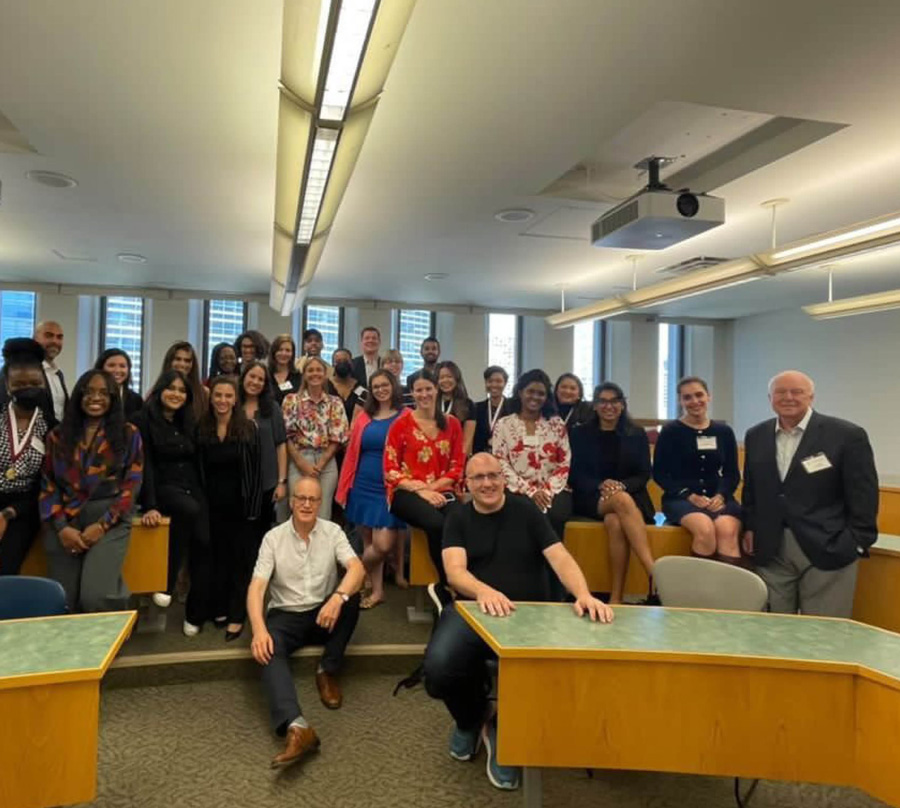

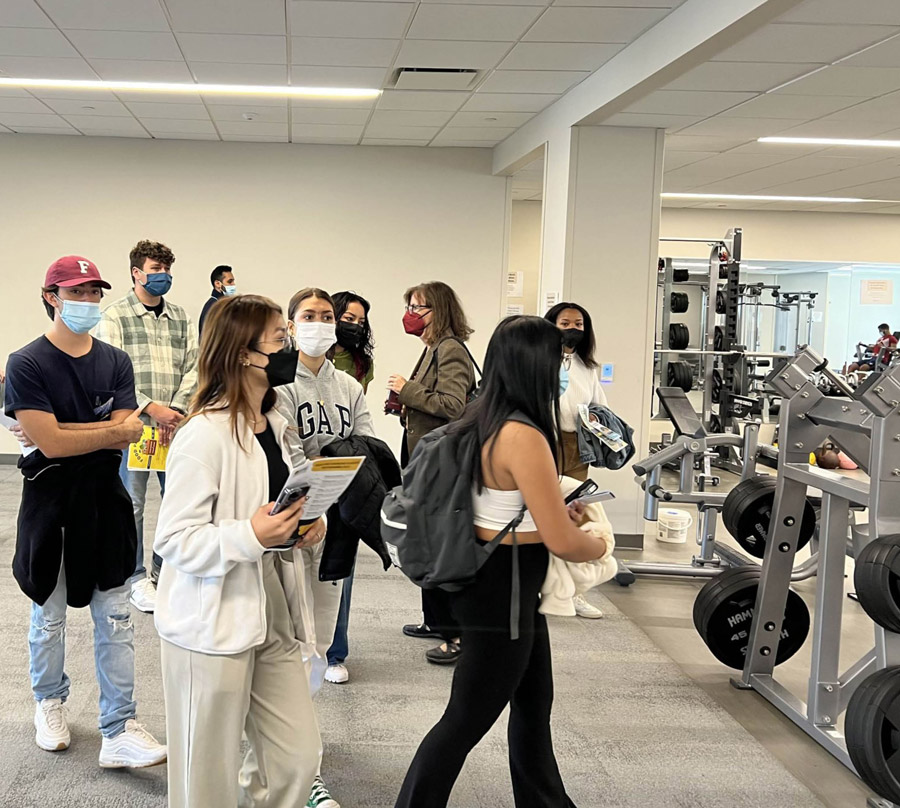

Learning By Doing



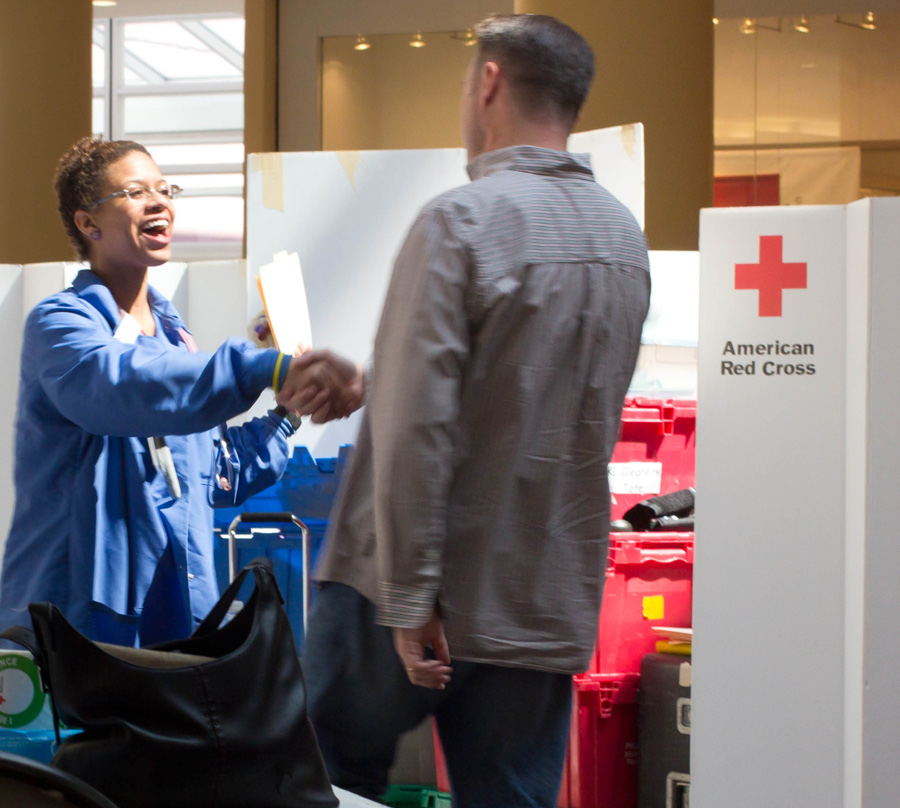
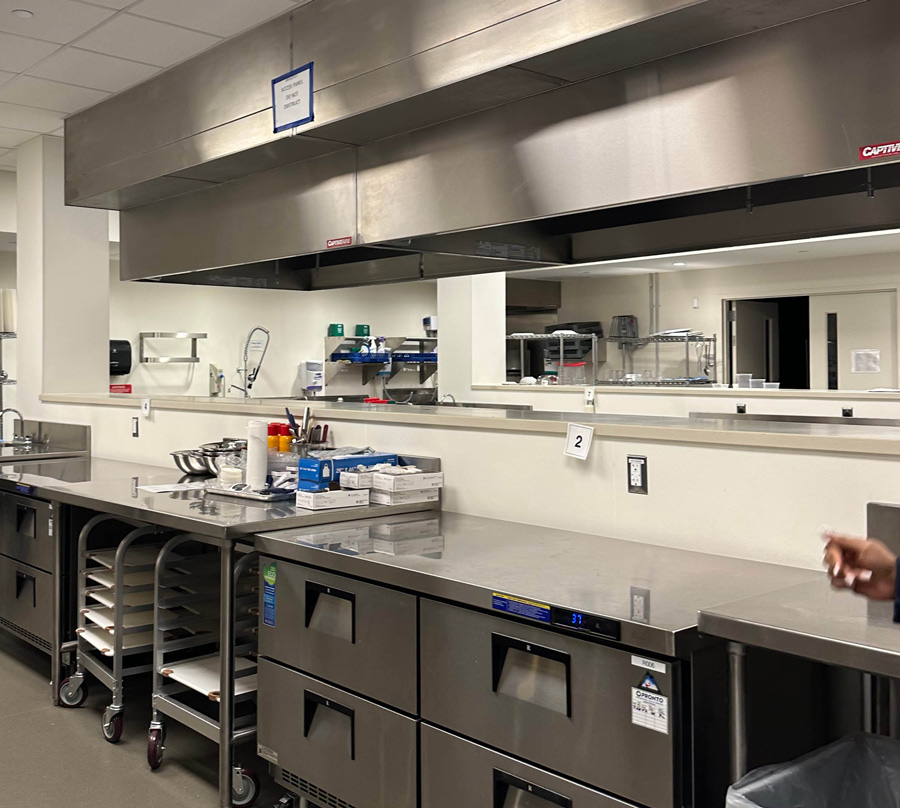
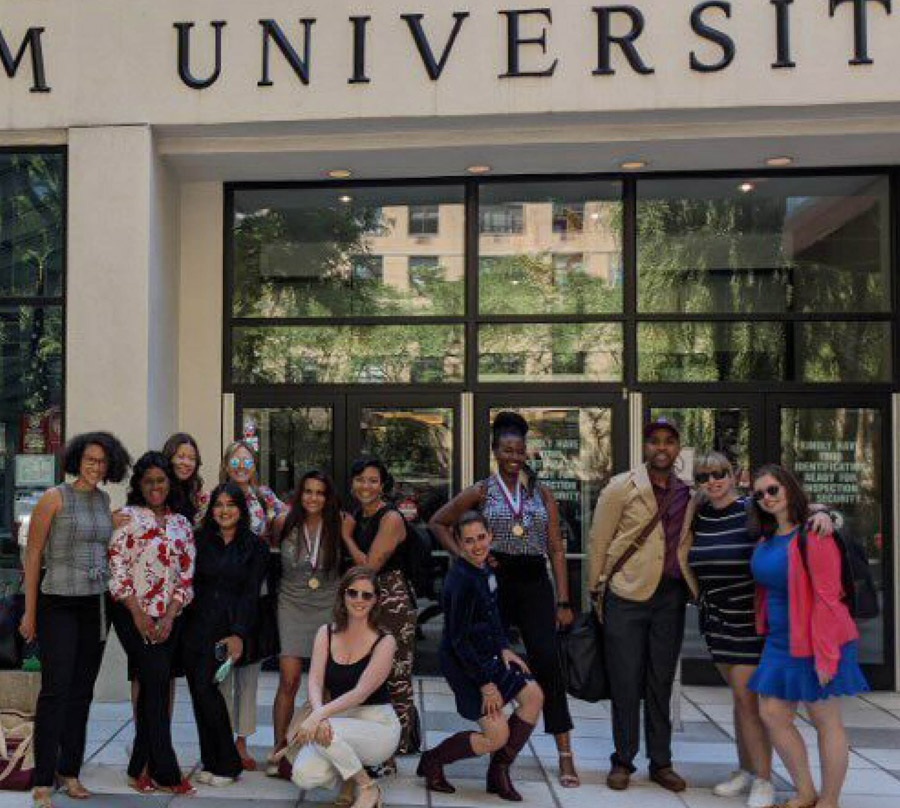
From undergraduates to MBAs, Gabelli School students have taken on many professional-level consulting projects, most recently working directly with the leadership teams of a New York City-based healthcare group, a national nonprofit, a global footwear company, an international veterinary pharmaceutical organization, and even the School’s own marketing division. They are solving actual business challenges with their creative ideas and research capabilities, learning to work effectively individually and in teams, and honing presentation skills they will use in their future careers.
Experiential learning projects such as these not only provide a platform for students to build their skill sets and résumés but also make it possible for them to establish and expand their professional networks, showcase their knowledge and talents, and pave the way for future job opportunities.
Promoting a New Health and Wellness Center in the Bronx
After a delayed opening and a few other obstacles, SBH Health System wanted to renew awareness of the Center’s many offerings throughout the Bronx community to reach those who could benefit from them the most. To support the effort, the Marketing area at the Gabelli School of Business assembled a task force of 35 volunteer undergraduate students to create a strategic communications plan for the Center. Students were charged with assessing the community’s needs and then creating messaging and programs that targeted key audiences to bring people in.
Mohammad Nejad, Ph.D., associate professor and area chair of Marketing; Linda Luca, codirector of the master’s program in marketing intelligence; and several members of the marketing faculty supported the students as they conducted research on demographics and developed actionable strategic plans, all for a good cause.
“Marketing can serve as a driving force for enhancing the well-being of consumers and society,” he said. “Our students worked throughout the semester to apply their learnings in classes to help this nonprofit introduce its offerings, particularly to the underserved population. We are proud of our students’ work.”
Luca added that the students volunteered to participate and their commitment illustrated how they embrace Fordham’s Jesuit philosophy of helping others. “It really strikes me that even if they’re busy, they want to go that extra step,” she explained.
The students found that throughout the Bronx, many residents trust their local pharmacists over the hospital for advice and care about their health. In order to build trust, they advised their client that the Center would have to distinguish itself from St. Barnabas Hospital. One of their messaging ideas was “Home for All Things Health,” positioning the Center as a friendly, welcoming place that supports healthy lifestyles and well-being. The students also suggested a roster of events the Center could host, such as cooking competitions, family movie nights, and yoga classes, as well as other supports it could provide, including groceries and childcare. Fresh produce and jars of honey from the beehives on the rooftop farm could be given out free as incentives to sign up for a membership.
“We realized that we had a good strategy, but at the same time, we also had to get down to the roots of their needs,” said marketing major Dana Vatafu, BS ’25. “Because they’re in communities where there’s a lot of food insecurity, we had to edit our message in order to better appeal to the fact that they need amenities.”
The students delivered a presentation of their marketing plan to the marketing department faculty and Ninfa Segarra, senior vice president of SBH Health System, whose feedback was positive.
“The most important part is [the students] got to the heart of the issue. I’m just so impressed with how well they captured this community we serve,” said Segarra. “I know this took a lot of work, and they’ve given us an extraordinary product.”
In turn, the students gained experience in developing a marketing communications plan for a real client. For Crystal Wu, BS ’25, the project had such an impact that it changed her future career plans.
“I thought I wanted to go into healthcare administration, then I realized that I want to take a healthcare marketing career path,” Wu said. “Being a bridge for the community and the Wellness Center was a great learning experience.”
Residency Project Helps Nonprofit Target Millennials
The students traveled from across North America to participate in the intensive, three-day residency project, meeting in person for the first time at Fordham’s Lincoln Center campus in June, according to Timothy Malefyt, Ph.D., clinical professor and director of the online M.S. in Strategic Marketing Communications program. Working in teams, 102 student-consultants analyzed the organization’s fundraising trends and identified the societal issues current donors are most interested in supporting. They then developed comprehensive marketing, management, and financial strategies to address them.
Lauren Campbell, MS ’23, and her team researched and pitched plans on how potential partnerships with Foot Locker and Nike could be leveraged to market to a millennial audience. As the operations manager for a hospital in Brooklyn, Campbell understands how vital communication is to the success of team projects.
“I developed and enhanced my communication skills in figuring out how to be highly engaged, find commonality, quickly determine everyone’s skill set, and also give people a safe space to speak up when they felt like something was going wrong,” she said. “I’ve definitely applied it in the work that I’m doing now in healthcare.”
Shelby VanSickle, MS ’23, senior director of channel marketing for Canada Beef, and her team pitched their idea for a partnership with the New York Jets that would include co-branded jerseys and blood drives at MetLife Stadium. She said that developing the pitch over three days was an exercise in time management, a valuable skill for students and professionals alike.
“Working with constraints is probably the best thing that I learned in terms of an overarching and tangible skill,” she said. “I think it’s important to learn both in an academic setting and in a work setting because there are going to be days when you have to stay and burn the proverbial midnight oil to get something done to deliver the type of product that you want to the client.”
Malefyt was impressed by how easily the students embraced new media to connect with a younger audience. “What was so neat was how terrific [students] were at including ideas from social media marketing and other very specific efforts,” he said.
The project materialized with the help of Mary Barneby, MBA ’79, regional CEO of the American Red Cross in the greater New York area, who kicked off the three-day residency by addressing students over Zoom. Other guest speakers included business leaders from NBCUniversal, Big Brothers Big Sisters of NYC, and Oak Knoll School.
Thomas Kissane, vice chair of CCS Fundraising and a consultant to the American Red Cross who was involved in the project, said the students were deeply engaged and understood how critically important the nonprofit sector is throughout the country. “They noted the impact the catalytic work of these organizations has on human services, access to education, [and] acceleration to research [which] allowed them to immediately conceive a number of pragmatic, yet also far-reaching strategies for the American Red Cross.”
Raising the Bar for Socially Responsible Footwear Manufacturing
The consulting assignment was part of the Markets, Business, and Society course taught by Miguel Alzola, Ph.D., associate professor of law and ethics and Grose Family Endowed Chair in Business at the Gabelli School. “Our class aims to help students develop a framework for decision-making not only to be consistent and walk the talk, but also to entertain a conversation about the values they serve and should be serving,” he said. “This was a great opportunity for the students to apply what they have learned in cooperation with a multinational company that is committed to value-based management.”
Throughout the eight-week project, 17 student teams studied different rubber certification organizations and assigned ratings based upon several criteria, including biodiversity protection, supply chain transparency, prevention of land-grabbing, respect for human rights, and environmentally friendly farming methods. Two other teams oversaw the project and ultimately recommended the Forest Stewardship Council in a final presentation to the company. Jacqueline Mazariego, one of the project leaders, said the Council emerged as having some of the strongest sustainable practices.
She added that the project was personally meaningful because, in addition to working with a major international footwear company on an actual ESG-related issue, Mazariego also developed valuable new skills. “I’ve never managed 90 people before,” she said. “Having done that makes me feel much more confident about managing people in the future.”
The project took root when Frank Zambrelli, executive director of the Responsible Business Coalition (RBC) at the Gabelli School, connected Alzola with the footwear company. The RBC includes a network of executives, researchers, nonprofits, and educators who aim to improve the business world’s commitment to ESG worldwide.
Zambrelli said that analyzing and adopting the rubber certification standard affirms the footwear company’s commitment to ESG, which will likewise reflect positively among customers. What’s more, sustainable business practice not only appeals to consumer satisfaction, but also to ethical regulation, a concept in which today’s business students need to be well versed, noted Zambrelli.
“There’s an amalgam of ethical decision compliance and regulatory decision stakeholder acceptance because your customers care and your employees care,” he said. “That mashup speaks to this next generation of students who need to come out of business school, or an MBA program, or any other context, with a 360-degree approach to all of these influences.”
Analyzing and adopting the rubber certification standard affirms the footwear company’s commitment to ESG, which will likewise reflect positively among customers.
Some students, like Lt. Col. Cesar Feliciano, have already applied what they learned from the project to their own businesses. Feliciano, who owns a private gym in Madrid, Spain, said that the footwear company’s dedication to sustainability is inspiring. Referring to his own business, he said, “Our strength comes from our brand quality, like the [footwear company]. Although they are a small player [among manufacturers that source rubber], the fact that they’re trying to be more sustainable brings value to them because they’re doing the right thing by the environment and society.”
Building a Sustainability Model from the Inside Out
The team of 12 students, which included undergraduates and graduates, worked on a semester-long consulting project with Zoetis, a leading producer of medicine and vaccinations for pets and livestock, as part of the course Sustainability and Strategy. The opportunity came about through a connection with Jeannette Ferran Astorga, BS ’96, who serves as executive vice president of corporate affairs, communications, and chief sustainability officer at the organization.
“The project was different from anything I experienced so far at Fordham,” said Martin Vukel, an MBA candidate and business analyst at Amazon. “Getting insight from the company on how we could implement these processes across different lines of business was immersive, and it enabled us to make an impact.”
Vukel and his classmates compiled ESG research and ratings to analyze how Zoetis could inspire its employees to embrace sustainability principles and align more with the organization’s overall sustainability strategy.
Eun-Hee Kim, Ph.D., associate professor and area chair of Strategy and Statistics, who teaches the course, organized three meetings with Zoetis throughout the semester. In September, the Zoetis team introduced the project to students. In October, the student teams presented their initial analyses and plans for further analyses, and the Zoetis team provided feedback. In December, the student teams did practice presentations with the Gabelli School’s Responsible Business Coalition (RBC), then delivered their final presentations to the Zoetis team.
“It’s one thing to come up with an excellent strategy, but implementing it is totally another dimension,” Kim said. “I thought this project was an excellent addition to that aspect of the course as students have limited opportunities to experience strategy implementation rather than formulation in class except through simulations.”
The students found that Zoetis can strengthen its sustainability messaging internally by “setting a sustainability knowledge baseline” for all employees and integrating it into the employee recruitment and review process.
“Engaging our colleague communications group, which works closely with human resources, has been a real strategic priority within the company to further define our employee value proposition,” said Andrea Nance, head of corporate sustainability at Zoetis. “Communicating our sustainability commitments and actions is a key part of that, and we can use that to potentially hire the best talent.”
Kristen Baxter, senior manager of sustainability integration at Zoetis, said that she and her colleagues valued the point of view of Generation Z students who, according to research studies, are drawn to companies that prioritize their ESG ratings. “I found the experience very valuable from that perspective, both from how we are seen externally and how the sustainability team might better engage with our Gen Z colleagues—and recruits—as we go forward,” she said.
For many of the students, this was their first opportunity to apply what they’ve learned about sustainability to a real consulting project. All of the students brought different perspectives to the mix, including Matthew Mininberg, MBA ’23, who drew from his professional background as a sustainability intern at Environ Energy.
“It integrated really well with what I do professionally,” he said. “I think everyone had a different approach to sustainability coming from different sectors, and it was something that also spoke to the way that we approached this project.”
Competition Inspires Creative Branding Ideas
The Gabelli School Branding Competition was inspired during a lunch conversation between Lerzan Aksoy, Ph.D., Gabelli School dean, and Mario Gabelli, BS ’65, namesake of the School. More than 130 graduate and undergraduate students took on the challenge of developing an integrated marketing and communications plan that would raise the School’s awareness and enhance its brand image. In teams, students had the option of centering their pitches around strategies that would engage prospective students, alumni, or outside businesses and talent recruiters. After several rounds, five teams were selected and they presented their strategic plans to a panel of faculty and administrators, including Dean Aksoy and Mohammad Nejad, Ph.D., associate professor and area chair of Marketing.
“Students are experiencing firsthand what the School offers, and they are uniquely positioned to use their creativity and knowledge to design plans and communicate them,” Nejad said. “Participants designed strategic plans to creatively share Gabelli School stories through various channels to audiences of different populations and generations.”
The winning team, Rekindling Ram Roots, proposed using storytelling as a way to inspire alumni to engage with the Gabelli School. Richard Puno, BS ’23, and his team members suggested individual stories that highlight a Gabelli School graduate’s impact on an individual or community-wide level. They believed that through personal narrative, others would be inspired to connect more deeply with the community.
Puno and his team pitched the series “Fordham Diaries,” which would feature pictures and captions of alumni on Instagram, LinkedIn, and other platforms. The students also proposed a contest to generate interest and tap personal stories from alumni. Their campaign ideas earned them $5,000 in prize money. The second- and third-place teams earned prizes of $2,500 and $1,000.
Puno said that the competition ignited a new career interest he plans to pursue when he graduates.
“Having the opportunity to solve a complex problem was what made me realize that I’m very interested in consulting,” Puno said. “The competition validated that I love strategizing and voicing out my ideas, and that consulting is for me.”
Linda Luca, who led the competition, said that all of the students’ perspectives were imperative to understanding what younger generations find engaging and how the Gabelli School could utilize that to further its mission.
“The benefit for us was hearing, from their perspective, how the School is different from our competitors,” she asserted, “while the benefit for the students was giving them a chance to share their ideas for enhancing and building the image of the School and the community of which they are a part.”